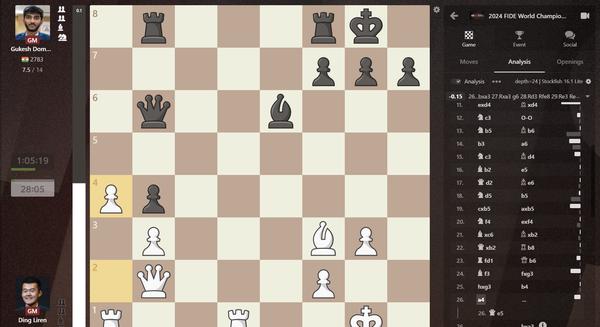The Fall of a Champion: Analyzing Ding Liren's Critical Error Against Gukesh
In the final game of the 2024 World Chess Championship, China’s Ding Liren made a catastrophic mistake in a drawable endgame position, losing his world title to 18-year-old Indian prodigy Gukesh D.

The dramatic conclusion of the 2024 World Chess Championship showcased both the ruthless nature of competitive chess and the immense psychological pressures faced by players at the highest level. In what should have been a straightforward draw, defending champion Ding Liren from China made an inexplicable error that cost him his world title.
The critical moment came when Ding, playing White, chose to make an unnecessary exchange with Rf2. This move, described by commentators as a beginner-level mistake, transformed a stable position into a losing one. The evaluation engines immediately showed a decisive advantage for Black, and Indian prodigy Gukesh D. converted his advantage with precise technique.
This result carries particular historical significance. At just 18 years old, Gukesh becomes the youngest World Chess Champion in history. For Ding, who made history as China’s first World Chess Champion in 2023, the loss represents a heartbreaking end to his reign.
The psychological aspect of this match cannot be overlooked. Throughout the tournament, Ding appeared to be playing under immense pressure, often choosing overly conservative approaches. This cautious strategy ultimately proved costly, as Gukesh’s more aggressive and confident play was rewarded.
The outcome reflects broader trends in contemporary chess. India’s rising dominance, led by a new generation of young talents, suggests a shifting of power in the chess world. The match also highlights how modern chess has evolved into an incredibly demanding sport where even the slightest lapse in concentration can have devastating consequences.
For Ding, who had previously disclosed struggling with mental health issues after winning the title, this loss may paradoxically bring some relief from the immense pressures of being world champion. His contribution to chess history remains secure as China’s first world champion, even if his reign proved shorter than hoped.
The match serves as a reminder that chess at the highest level is not merely about tactical and strategic ability, but also about maintaining psychological resilience under extreme pressure. In the end, it was not just a battle of moves on the board, but a test of nerves that determined the outcome of this championship.